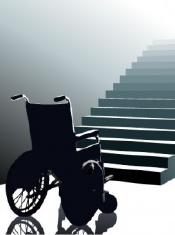What’s the hardest thing you’ve had to do?

Have you ever wished you could gracefully get out of a situation? That’s how I felt when I arrived at my last speaking engagement.
The small church invited me to their men’s group, the sort of experience I usually anticipate and enjoy. I love the opportunity to connect and share in an intimate setting.
But that night I wanted to escape. The elevator was broken; ten imposing steps stood between me and the meeting room.
The man who invited me apologized profusely. He’d contacted me earlier to explain the situation and offer the opportunity to re-schedule. I replied that if they were willing to help me, we’d go ahead as planned.
Now, facing those ten steps, I regretted my false bravado.
I hate being carried; I especially hate being carried in public by strangers. I can’t adequately describe the horrible feeling of helplessness that arises when I’m hauled like a piece of baggage.
People stare—I know they’re only concerned for my welfare, that they don’t mean to be rude. And the guys carrying me—why do they get to be strong and helpful? Why do I have to experience this degrading dependence?
But it was too late now, so I leaned back and allowed four strangers to lift what felt like a useless, lifeless body up those ten steps.
As I tried to calm my heart and prepare for my presentation, I thought about this incident in Jesus’ early ministry.
A few days later, when Jesus again entered Capernaum, the people heard that he had come home. So many gathered that there was no room left, not even outside the door, and he preached the word to them. Some men came, bringing to him a paralytic, carried by four of them. Since they could not get him to Jesus because of the crowd, they made an opening in the roof above Jesus and, after digging through it, lowered the mat the paralyzed man was lying on. [Mark 2:1-4]
I know exactly how that man felt—friends carting him around, creating a spectacle, calling even more attention to his pitiful plight.
What right did this guy and his buddies have to demand access? Why couldn’t he just accept his place on the edges? He was making everyone uncomfortable, interrupting their dinner as well as Jesus’ teaching.
And they destroyed the roof! I can only imagine the disruption, the mess, the mixture of pity and outrage.
So I began by referencing this story, thanking the men who helped me, and joking that at least they didn’t have to create a makeshift skylight in the church ceiling. Everyone chuckled
My prepared remarks went well, and then it was time for discussion and questions.
What’s the hardest thing you’ve had to do?
I could have answered safely, offered an example of some trivial physical accomplishment. But that’s not what he was asking and this gathering wasn’t about being safe. So I answered honestly “The hardest thing I’ve had to do … was to let you carry me up the stairs.”
Men are supposed to be strong, independent, self-sufficient. We stand tall. We don’t watch things happen, we MAKE things happen.
That not how life feels in a wheelchair.
In a wheelchair you ask for help with simple tasks that everyone else takes for granted. The item you need at the grocery store is always just out of reach. The single step into a friend’s house is an insurmountable obstacle.
In a wheelchair you quite literally allow others to wash your feet—along with other, much more personal, acts of service.
In a wheelchair you learn that humble, humility, and humiliating all originate from the same root word.
I’m not thankful for being in a wheelchair, but I can be thankful in a wheelchair. I am not grateful for my injury, but I am grateful for the lessons it’s taught me. One of those lessons is the humility to allow others to help.
In a wheelchair, you get carried by strangers. It’s the hardest thing I’ve had to do.
What’s the hardest thing you’ve had to do?
Your attitude should be the same as that of Christ Jesus … [Philippians 2:5(a)]
